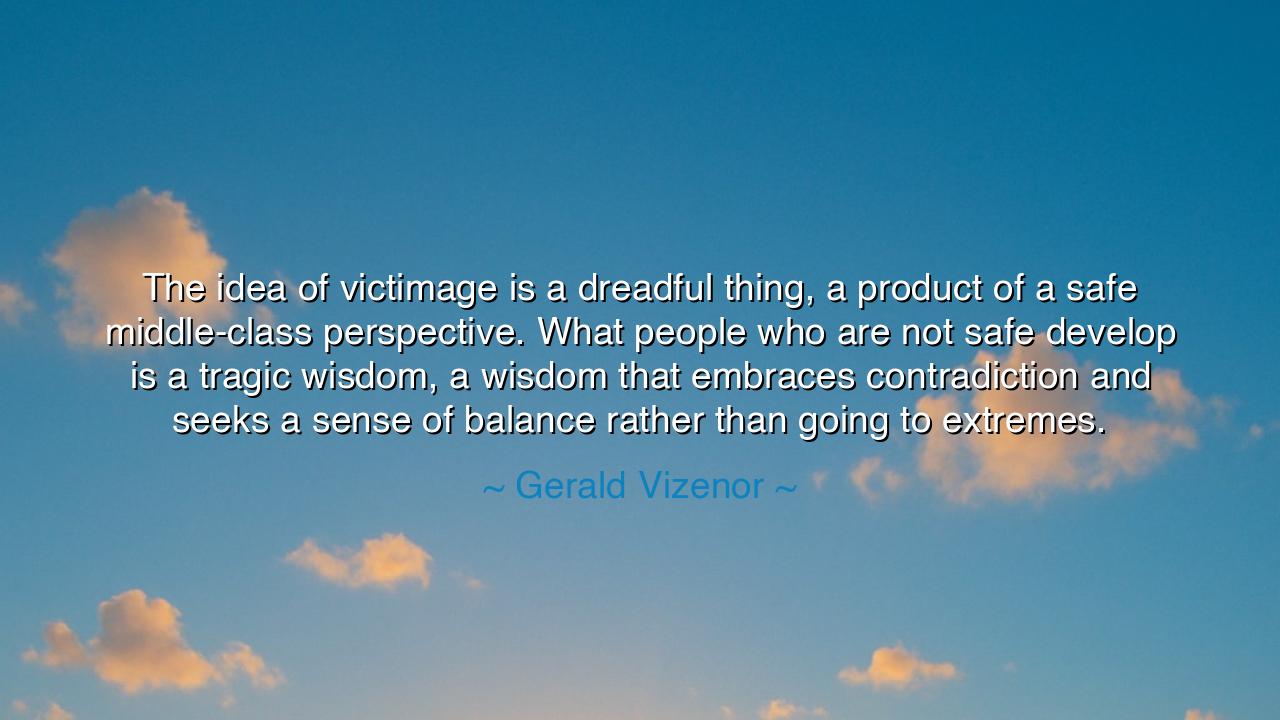
The idea of victimage is a dreadful thing, a product of a safe
The idea of victimage is a dreadful thing, a product of a safe middle-class perspective. What people who are not safe develop is a tragic wisdom, a wisdom that embraces contradiction and seeks a sense of balance rather than going to extremes.






The words of Gerald Vizenor ring like the voice of an elder who has walked through fire and returned bearing wisdom. He warns us against the illusion of victimage, a cloak worn by those who are safe enough to call themselves wounded, yet do not truly dwell among the ashes of suffering. It is the middle-class comfort that turns pain into performance, tragedy into spectacle, and grievance into a posture. But those who have lived with danger, exile, and hunger do not cling to such masks—they birth a deeper understanding, a tragic wisdom that does not flee from contradiction but embraces it like a stern teacher.
This tragic wisdom is not born in safety, but in survival. When the earth shakes and the storm devours, men and women do not speak of their injuries as ornaments; they speak instead of balance, of how to walk between life and death without falling into despair. They do not waste their strength in extremes, for extremes burn the spirit. Rather, they weave together laughter and tears, victory and loss, knowing both are threads of the same eternal cloth.
History offers us the story of Nelson Mandela, who endured decades in a prison cell on Robben Island. A lesser soul might have emerged in bitterness, nursing the poison of victimage, proclaiming endlessly the wrongs done to him. Yet Mandela chose another path: he bore the contradictions of justice and forgiveness, vengeance and peace, and from that crucible forged a balance that healed a nation. His greatness lay not in denying the wound, but in refusing to let the wound define him. Such is the mark of tragic wisdom.
The ancients, too, knew this truth. The Greeks called it sophrosyne, the temperance that tempers heroism with humility. They saw in tragedy not the glorification of despair, but the mirror of the human heart, which learns to endure contradictions without surrender. The warrior who sees death on the battlefield yet still lifts his shield is greater than the poet who sings of grief while resting by the hearth.
Thus, children of the future, learn this lesson well: do not hunger for the easy crown of victimage. It is a fragile jewel, glittering only in the eyes of those who have never known fire. Seek instead the steady flame of tragic wisdom, which is the inheritance of the scarred and the steadfast. In it you will find not only survival, but harmony, not only sorrow, but strength. For balance is the root of freedom, and contradiction the mother of truth.






DBNguyen Duy Bao
This quote really makes me reflect on the value of complexity and nuance. Vizenor’s distinction between safe, victim-based perspectives and the wisdom that comes from lived contradiction seems profound. But I also wonder — does this ‘tragic wisdom’ always come with a cost? Is it possible to find a balance in life without having to experience deep struggle, or is that something reserved only for those who have faced adversity head-on?
DTTran Duc Trung
Vizenor’s words make me think about how easy it is for those in more comfortable positions to embrace black-and-white thinking, assuming that life can be neatly categorized. But the wisdom he describes seems more nuanced — acknowledging the contradictions of life. How can we embrace balance without falling into extremes? Is it possible for anyone, regardless of their situation, to develop this kind of wisdom, or does it take a certain amount of suffering?
DDPham Duy Dat
I’m struck by how Vizenor contrasts the ‘safe middle-class perspective’ with a more complex, ‘tragic wisdom.’ It makes me question how much of our worldview is shaped by our circumstances. Do people who have never faced real danger or struggle miss out on this deeper understanding? And is there a way to access this wisdom without needing to endure extreme hardship? It’s a thought-provoking take on perspective and growth.
PTLe Phuong Thao
This quote challenges the idea of victimhood, especially from a privileged standpoint. It’s interesting because Vizenor suggests that wisdom is not about blaming external forces, but about understanding and accepting contradictions. I wonder if this kind of wisdom comes more naturally to those who have faced hardship, or is it a learned skill? Can people from privileged backgrounds also cultivate this type of wisdom, or is it something that requires lived experience?